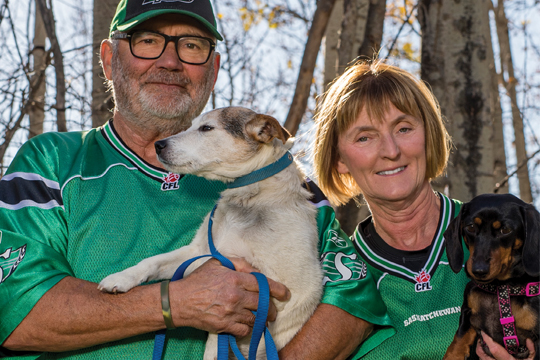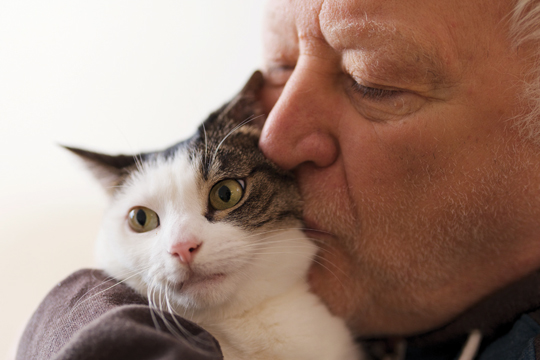
Sheryl and Larry Busser were down to one dog — Gainer, the Jack Russell terrier in Larry's arms — from their previous three when the pandemic hit. They wanted a companion to perk up 13-year-old Gainer, so they adopted Greta, the one-year-old dachshund in Sheryl's arms. Credit: Liam Richards
Sheryl Busser proudly admits that her life has gone to the dogs.
Over the years, her fur babies have travelled with her and her husband from Vancouver Island to Newfoundland to the Yukon and Alaska, as well as throughout the United States, including the Vegas Strip. Since wrapping up her career at Corrections Canada, where she worked as an administrative assistant, more than one person has asked her why she would want to be tied down with dogs in retirement. But Busser and her husband, Larry, who joined the National Association of Federal Retirees in 2014, hardly feel like they’re on a short leash. They frankly can’t imagine a life without their faithful travel companions.
Four years ago, their pack shrunk when they lost their beloved dachshund, Dora, then Lacy, their Jack Russell, two years later. That left them with Gainer, a Jack Russell who is now 13.
With fewer four-leggeds running around, the Busser’s home in Prince Albert, Sask., felt empty, and Gainer started to act like an old dog. In the summer of 2020, while spending more time at home and camping, Busser’s husband suggested it might be a good time to grow their numbers to help perk up Gainer.
“We were at home so much with the pandemic, constantly at first. Our neighbour across the street got a new dog. Then our daughter… One thing led to another, and I got swept along.”
Busser had reservations, wondering if she had time to juggle a puppy and grandchildren.
“I was just thinking we’re back at square one with potty training, chewing and going outside in the middle of the night,” she says. “It’s like when the kids turn five and you decide to have another one.”
She was also concerned about how Gainer might respond.
“Jack Russells are smart, particular little dogs. I thought he might be annoyed by a puppy, as he’s been the top dog for some time. That was my biggest worry,” Busser says, but eventually she went for it, and brought home Greta, a one-year-old dachshund.
“His nose was a bit out of joint at first, but now Gainer loves Greta. They play together, sleep together. They’ve developed a great friendship. Greta is mischievous and has really picked Gainer up. It’s like having a new kid in the house.”
In Miramichi, N.B., Ann Rendell’s husband was also the impetus behind their furry addition, despite years of vowing to never have another dog after losing their Lab-shepherd mix, Chase.
“That went on until this year when we decided it wasn’t working,” Rendell says. “We were at home so much with the pandemic, constantly at first. Our neighbour across the street got a new dog. Then our daughter, who lives in Ireland, got a dog. One thing led to another, and I got swept along.”
This past July 1 weekend, Trixie, their third Shetland sheepdog (sheltie), came to live with them. But she was no puppy. Rather, she had finished breeding and was happy to put motherhood and its responsibilities behind her.
“She is retired like us,” says Rendell, a Federal Retirees member who spent 25 years working as an interviewer for Statistics Canada and retired at 73. “We ended up deciding to look for an older dog as, being in our 70s, we weren't sure we were up to raising an energetic puppy. We’d much rather have someone more in tune with our own energy levels, and that’s her. She suits our lifestyle.”
Trixie is happiest curled up next to her humans or puttering with them on their property on the Miramichi River. She has her quirks, however. She’s afraid of machines and barks at them to let them know. The normally gentle house cat, Bella, also sends Trixie running scared in the opposite direction.
“She’s like someone who lived in the convent for 20 years and they just let her out,” Rendell laughs. “Trixie just stands and stares at the big wide world. She doesn’t know how to play. If you throw a ball, she stands there and looks at you as if to say, ‘that was stupid.’”
But with some patience, understanding and socializing, Trixie has fit right in.
“It turned out to be a real blessing,” Rendell says. “She’s a very gentle, lovely dog. She makes us quite happy. We gave a little girl a home that needed one. It was kind of a marriage that happened by accident and worked out really well. She has really brought life to a very quiet house.”
During the pandemic, François Taisne has only left his Montreal apartment for the essentials. A retired lawyer, he lives alone in his large apartment, with his cat for company. “I need somebody to live with me,” he says.
For 20 years, that somebody was his beloved Pepe. An ever-present furry shadow who slept on Taisne’s desk as he worked and curled up beside him in bed, it was perhaps always going to be that Taisne would be near when Pepe died. That sad moment came late this past summer as Taisne sat on his couch, watching television. One moment, Pepe was purring in his arms; a breath later, he was gone.
“I was in shock when he died,” Taisne says.
A few weeks later, at the urging of his kids, he found himself at the Montreal SPCA, and quickly wrapped around the paw of a little lass he’s named Luna.
“She’s just beautiful. I think she was looking for somebody as well.”
Luna has picked up where Pepe left off. No surprise, she’s the boss. “I’m retired, so the only thing I have to do is take care of her,” Taisne says.

François Taisne, a retired lawyer who lives by himself and lost his 20-year-old cat,
Pepe, last summer, realized he needed a companion and adopted Luna, shown here.
In turn, she takes care of him. When, he had minor heart surgery recently, she never left his side as he recovered. For him, a constant companion when he has to keep his distance from so many in his life is furry perfection.
“She brings me joy,” Taisne says. “I am really lucky. She’s the best cat I could have.”
Forced apart from family and friends during the pandemic, people have sought the companionship of animals in record numbers. Given the increased risk COVID-19 posed to seniors, they were disproportionately distanced from their social circles, so the company of a pet has been most welcome, particularly for those who live alone.
According to the Ontario SPCA, nearly three in 10 Canadians adopted a pet during the pandemic. In many areas, shelters and rescues have been overwhelmed by the increased demand.
In Dartmouth, N.S., Cynthia Hodgins spent months this year scouring shelter and rescue websites. She had held off on getting another dog when she retired from nursing two years ago, as she was keen to travel. For the first year of the pandemic, she and her husband thought things would soon blow over and that they’d be back on the move before long. But when it became clear they wouldn’t get to visit family in Labrador and Ontario anytime soon, it seemed like the right time to add a four-paw to the mix.
She soon realized everyone had the same idea. Her two previous dogs were rescues, and while she initially intended to rescue another, the sparse supply led her to contact breeders.
By September, she had Sam, a mini Australian Labradoodle who has become her regular walking companion in a neighbourhood full of furries. Through him, Hodgins says she’s come to know people who would previously only say hello as they passed by. Now, everyone stops to chat.
“It really is more social when you have a dog. Of course, we know all the dogs’ names, but don’t remember their owners’ names,” she says.
Neither she nor her husband have family in town, and as the pandemic dragged on, that separation and disconnect started to wear on them. Sam has worked wonders to fill some of that void, providing the endless entertainment only a puppy can.
“A dog is someone to talk to. It’s not so lonely when you have someone to care for,” Hodgins says. “And it gets you outside, rain or snow. But the companionship is what matters the most. You just don’t get that out of a cat.”
Her husband, James Rogers, who had only owned cats in his life, might have initially begged to differ. But he is quickly becoming a dog person and says Sam has given him a new “leash” on life.
“I’m finding it’s a good thing for me because I get out more to get the walks in with him. I have a new outlook as far as getting up and getting out,” he says.
“Sam brings a lot of joy and that’s something I haven’t said in a long time.”
As a couple who have their own interests, don’t have kids and married later in life, Sam is also a common interest to share.
For Association member Sheila Nixon of Calgary, pets have been an ever-present part of her life. Her beloved German shepherd, Asia, died a year before she retired from her accounting position with the Canada Revenue Agency. But with plans to travel in retirement, she and her husband thought a pet probably wasn’t the best idea.
And yet Nixon couldn’t imagine living without a pet in the house. So, she turned to fostering and has since fostered nearly everywhere she’s travelled in North America, taking upwards of 50 animals into her homes away from home.
When the pandemic was declared in March of 2020, Nixon and her husband were in Mexico, fostering a lovely bully named Brownie for Mazatlan Animal Rescue. They’d committed to helping Brownie get used to house-training, walking on a leash and being part of a household to increase her odds of adoption, so they hunkered down with the dog as the world closed up. They didn’t return to Canada until the end of April 2020.
Back home in Calgary, restricted social contact made for a summer without card games, potlucks or the Stampede. Skyrocketing dog adoptions meant there were none to foster. That’s when Nixon started fostering cats from ARTS Senior Animal Rescue.
“Animals are such an important part of our life,” she says. “Whether I have them for two days or two months, I can’t imagine a life without them. When things are going wrong in your life and you snuggle with your pet, they just make life better. They’re just such a comfort. They give more than they get. They bring something to life that humans can’t.”

